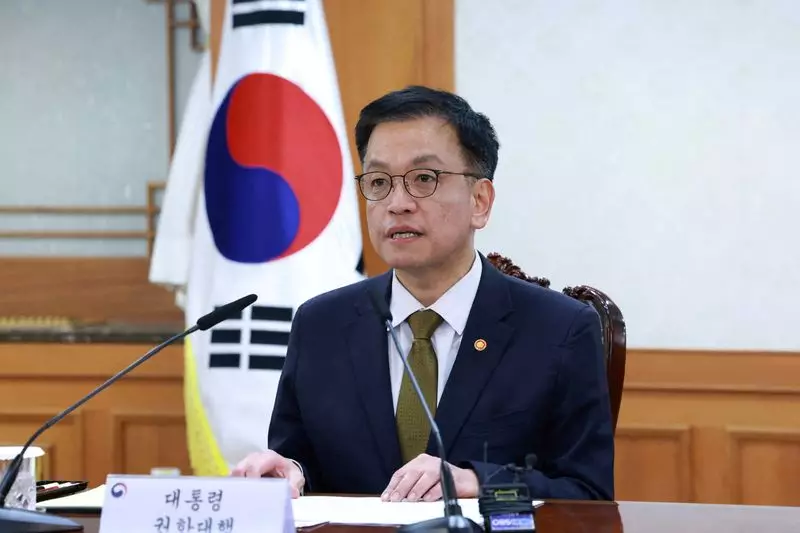The relationship between South Korea and the United States has always been of strategic importance, particularly given the geopolitical tensions in the region. As South Korea’s acting president, Choi Sang-mok, steps into his diplomatic role, the dynamics of this relationship are expected to evolve amidst new leadership in Washington. Choi, who is not only the acting president but also the finance minister, aims to solidify ties with the U.S. by fostering mutual interests that resonate with the long-standing values of the Korea-U.S. alliance.
Choi’s recent statements illustrate a thoughtful consideration of the intricate balance that must be maintained when navigating these bilateral relations. The emphasis on the slogan “We Go Together” indicates a recognition of shared values, which can serve as a foundation for renewed cooperation. Furthermore, there have been indications that Choi is keen on establishing a direct line of communication with President Donald Trump. Such proactive engagement could pave the way for smoother diplomatic exchanges and open channels for discussing pressing issues impacting both nations.
The backdrop to these diplomatic ambitions is South Korea’s political upheaval. Following the impeachment of key figures in government, including President Yoon Suk Yeol and Prime Minister Han Duck-soo, Choi is tasked with steering the nation through what some consider the most significant political crisis in South Korea in decades. This domestic instability has placed South Korea at a diplomatic disadvantage, making it critical for Choi to work diligently to project a unified front in international relations.
While neighboring nations like China and Japan have sent high-profile representatives to Washington to strengthen their ties, South Korea’s representation during important events, such as Trump’s inauguration ceremony, drew attention. The presence of Ambassador Cho Hyun-dong was notable, yet there was a clear absence of broader political backing from diverse party affiliations within South Korea. This contrasts with the strategic maneuvers of other countries, underscoring the need for South Korea to enhance its diplomatic posture in the face of adversity.
Choi’s administration is keen to address potential economic impacts stemming from Trump’s policies, particularly those relating to tariffs and electric vehicles. With South Korea enjoying a substantial trade surplus with the United States—recorded at $55.7 billion—concerns are mounting that Trump may implement protective measures that could undermine this economic boon.
Through a nuanced understanding of these challenges, Choi has articulated a strategy for reviewing response measures to safeguard South Korea’s economic interests. The specter of tariff increases, especially given Trump’s consideration of imposing additional duties on imports from countries like Canada and Mexico, has already started to reverberate across South Korean markets. The KOSPI index’s swift reaction to Trump’s potential policy changes illustrates the sensitivity of the South Korean economy to external shocks.
In addition to economic worries, defense costs have emerged as a contentious centerpiece in discussions between the two nations. With around 28,500 U.S. troops stationed in South Korea as a deterrent against North Korean aggression, the financial burdens of maintaining this military presence are under scrutiny. Trump’s past demands for increased contributions from Seoul raise uncertainties about the future of this arrangement, particularly as both countries navigate evolving security threats.
Despite the challenges ahead, the potential for growth in cooperative measures, particularly in the shipbuilding and technology sectors, has been identified as a positive possible outcome. Trump’s interest in working closely with South Korean battery manufacturers and shipbuilders may signal a willingness to deepen economic ties, contingent upon mutual agreement on difficult issues.
As South Korea under Choi Sang-mok strives to navigate a complex landscape of both domestic turmoil and shifting foreign policies under Trump’s administration, it is crucial for the nation to recalibrate its diplomatic strategies. By fostering collaboration based on a shared commitment to values and interests, South Korea has the opportunity to influence U.S. policy making in a manner that is beneficial to both nations. Ultimately, the road ahead will require finesse, resilience, and strategic acumen to ensure that the Korea-U.S. alliance emerges stronger in a challenging geopolitical climate.

